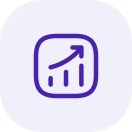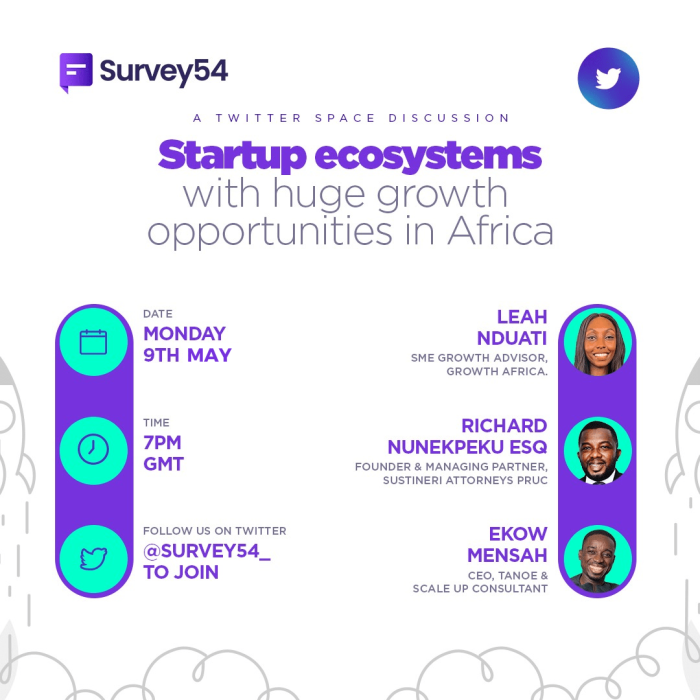South Africa has the most developed African startup ecosystem, beating out Kenya, Nigeria, and Rwanda, even though Lagos tops as Africa’s startup capital. (StartupBlink Ecosystem Index Report 2021)
Welcome to the summary of our Twitter space conversation Startup Ecosystems with Huge Growth Opportunities in Africa.
ICYMI: Listen to the entire discussion here.
The speakers at the event were Leah Nduati (SME Growth Advisor, Growth Africa), Richard Nunekpeku ESQ (Founder/Managing Partner, Susteneri Attorneys Pruc.), and Ekow Mensah (CEO, Tanoe & Scaleup Consultant).
Our speakers shared their insightful thoughts on this topic:
1. How would you explain a startup ecosystem?
- A startup ecosystem establishes a specific atmosphere in which individuals, organisations, and groups can start, properly manage, and test their ideas in real-world settings. These ecosystems are like a community of resources, opportunities, networks, and government collaborations that makes it easier for individuals and groups to come up with and test out new ideas until they are market-ready. When they do, they’re able to attract the resources and opportunities they need to grow beyond their current capacity.
- It’s a place where new ideas can bloom into viable enterprises with the potential for rapid expansion. Institutions, governments, private citizens, academic institutions, and even religious organizations work together to create an atmosphere that encourages people to start, operate, and expand their enterprises.
- In Leah’s view, a startup ecosystem is a group of entrepreneurs working together to create jobs, create solutions to societal issues, give investors a chance to participate, and support other entrepreneurs in their efforts to grow their businesses.
- For this to succeed, the government has to create an enabling environment supporting organizations like incubators and coworking spaces, accelerators, and entrepreneurs alike. The entrepreneurial spirit lives on because of a vast network of such individuals and organizations.
- On Richard’s part, the overall regulatory framework has a significant impact on the ecosystem. When it comes to regulation, there isn’t much of a difference between startups and growing/existing/matured companies. They are all subject to similar regulatory obligations within the ecosystem.
2. In your experience, what are some top ecosystems with huge opportunities in Africa?
- According to Richard, technology is taking the lead in both the workplace and personal lives, and so tech-based ecosystems make up a large portion of the thriving ecosystems. Whether they are financial, insurance, or edtech, they all have a role to play.
- Leah is of the opinion that there isn’t a single most effective ecosystem, many ecosystems are being highlighted right now because of the tech solutions coming out of them.
- Ekow believes that three main factors typically support a thriving ecosystem:
- The number of incubation and acceleration hubs in the country.
- The rate at which the businesses that are coming through these hubs are growing and can solve problems, create jobs, and support the economic growth of the companies.
- The level of funding that these businesses attract.
3. What role does research play in identifying profitable African startup ecosystems for investors and founders?
- Leah: Research is critical to ensure that industry participants can reap the benefits of the ecosystem. Unfortunately, Africa hasn’t tapped into the power of data to help us grow as businesses.
- Research makes it easier for businesses to tell their market size, the possible threats they could face, and other necessary data they need to take informed steps.
- Research is essential since the challenges that firms are seeking to solve are focused on impact. We can’t talk about value without talking about numbers, which is how firms quantify their impact. Research makes impact quantifiable.
- Governments in Africa also depend on data to tell the correct numbers on trade volumes and other relevant metrics.
- Ekow adds that the whole point of research is to make the information that leads to better decision-making available.
- The important thing about research is the potential to plan ahead and seize opportunities. Sadly, that’s where Africa tends to fall short of the mark on a regular basis. Online research studies about Africa tend to be dominated by reports from companies based outside the continent. Imagine someone from outside telling us who we are, our potential, and what we deserve to attract!
- In the absence of any data generated that can be used to question this foreign data—most of which is secondary—you are always left at the mercy of others’ estimations of your value. You have no choice but to accept what others say about your worth.
- As a result, Africa must focus on producing original, primary data that we can utilize first to plan. It is not enough to tell the world that Africa is the next best place to invest. We must be able to build data to support why the rest of the world needs to come to Africa for their good and not ours.
- Data is critical to attracting the best investors to startups. They would be devalued without data, and when they’re discounted, they are already bought off, and their impact on their home country is practically non-existent.
4. Aside from funding, are there any particular factors that serve as hindrances to African businesses carrying out research?
- Richard believes that the lack of understanding of the relevance of data to business decisions is prevalent across Africa. Scare/unavailable funding is just a weak excuse. When it comes to your company’s growth, money shouldn’t be an excuse. After all, running a firm necessitates the expenditure of funds on various other items. So, why not on data?
- Ekow agrees with Richard that the importance of research on the growth of African enterprises is mostly ignored.
- Culturally, Africans are not oriented to use data to make decisions as most of us are religious about a lot of our choices. So, we make significant decisions based on faith and not on data.
- Therefore, it is important to point out that our disregard for research data while making business decisions is a major factor in why most of our businesses in the continent fail to last more than two or three generations.
- Entrepreneurs in Africa need to start thinking about long-term data sources that will help them expand their enterprises beyond the initial stages. The lack of data is why many businesses in the continent die with their founders because all ideas are in the founder’s head and not adequately documented.
5. Are there any oversaturated startup ecosystems on the African continent right now that potential founders and investors should be paying attention to?
- Richard is of the opinion that the African market is one in which opportunities abound. The main difference within the continent’s ecosystems should be a discussion about what kind of support is available locally and how those who are lagging might step up to fill up the gaps.
- Instead of talking about saturation, we should instead focus on relevance. This is because an ecosystem can be saturated, but does it churn out startups relevant to the African market?
- There shouldn’t be a perception that one market on the continent has greater promise or opportunities than another. As a result, the entire startup ecosystem must be treated as a single market, and only the incubator and accelerator supply systems, government/private sector partnerships, and the general regulatory regime governing how businesses are supervised should be considered.
- African startups, according to Ekwo, are just getting started. As a result, we have no basis on which to speak of oversaturation. Even while we’ve made some progress, we’re still lagging behind other continents.
- As of yet, African startups haven’t spread across the continent, much less penetrated markets outside the continent. As a result, there is still a lot of work to be done until we take the reins of global affairs.
- Founders, governments, regulators, and everyone else in the sector should start thinking about expanding into a global market. It is imperative that we invest in local ideas and provide them with the support they need to grow into global brands.
Bridge the data gap in the African startup ecosystem:
Safiyo by Survey54 is an all-in one dashboard where startups in the African ecosystem can run surveys to understand their potential customers, test products and concept, and track market trends.
Register an account to get started.











